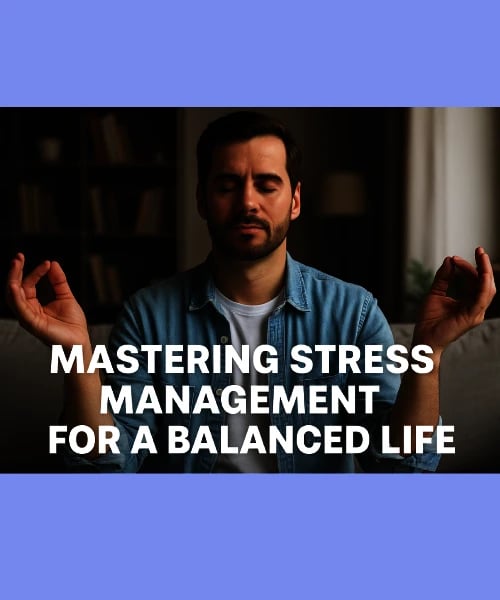Beyond the Grind: Mastering Stress Management for a Balanced Life
Discover effective stress management techniques to find balance and peace in your life. Learn practical tips for reducing stress, improving well-being, and living beyond the daily grind.
SELF-IMPROVEMENT & PERSONAL GROWTH
E.O. FRANCIS
7/25/20253 min read


Stress management is essential for a healthy and happy life. Many people feel trapped in a cycle of stress, but learning to control it can bring peace and balance. This guide will teach you proven stress management techniques to help you break free from constant pressure. You will discover how small changes in daily habits can lead to big improvements in well-being.
Understanding Stress and Its Effects
What Is Stress?
Stress is the body’s natural response to challenges or threats. It can come from work, family, money problems, or unexpected life changes. A little stress can be motivating, but too much can harm your health. Recognizing the signs of stress is the first step to managing it.
How Stress Affects Your Body and Mind
Chronic stress takes a toll on both physical and mental health. It can cause headaches, muscle tension, and trouble sleeping. Over time, it weakens the immune system and increases the risk of serious illnesses. Mentally, stress leads to anxiety, irritability, and difficulty concentrating. Learning to manage stress can prevent these problems before they get worse.
Common Sources of Stress
Work pressure, financial worries, and relationship conflicts are major stress triggers. Even positive events like weddings or new jobs can be stressful. Identifying your personal stress sources helps you address them directly.
Effective Stress Management Techniques
Practice Mindfulness and Meditation
Mindfulness keeps you focused on the present moment instead of worrying about the past or future. Simple breathing exercises can calm your mind in minutes. Meditation, even for just five to ten minutes a day, reduces stress and improves mental clarity.
Exercise Regularly
Physical activity is one of the best ways to relieve stress. Exercise releases endorphins, which are natural mood boosters. You don’t need intense workouts—walking, yoga, or dancing can all help. Find an activity you enjoy so it becomes a habit rather than a chore.
Improve Your Sleep Habits
Poor sleep makes stress worse, and stress makes it harder to sleep. Aim for seven to nine hours of quality rest each night. Create a bedtime routine by avoiding screens, caffeine, and heavy meals before bed. A dark, quiet room helps you fall asleep faster.
Set Boundaries and Learn to Say No
Taking on too much leads to burnout. Many people struggle with saying no, but setting limits protects your mental health. Prioritize your own needs and avoid overcommitting. It’s okay to decline extra tasks if they add unnecessary stress.
Eat a Balanced Diet
What you eat affects how you feel. Processed foods, sugar, and caffeine can increase stress levels. Instead, choose whole foods like fruits, vegetables, lean proteins, and whole grains. Staying hydrated also helps your body handle stress better.
Connect with Supportive People
Talking to friends or family reduces feelings of isolation. Strong relationships provide emotional support during tough times. If you don’t have close connections, consider joining a support group or seeking therapy.
Take Regular Breaks
Nonstop work leads to mental exhaustion. Schedule short breaks throughout the day to relax and recharge. Even a five-minute walk or deep breathing session can refresh your mind.
Long-Term Strategies for Stress Management
Develop a Positive Mindset
Negative thinking makes stress feel worse. Practice gratitude by listing things you appreciate each day. Reframing challenges as opportunities helps you stay calm under pressure.
Time Management Techniques
Poor time management creates unnecessary stress. Use tools like to-do lists, calendars, and prioritization methods. Breaking tasks into smaller steps makes them feel less overwhelming.
Find Healthy Outlets for Stress
Creative activities like writing, drawing, or playing music can relieve tension. Hobbies give your mind a break from daily pressures. Find something you enjoy and make time for it regularly.
Limit Exposure to Stressful Triggers
If certain people or situations always cause stress, reduce your exposure. This might mean setting boundaries, avoiding negative news, or changing routines. Controlling your environment helps minimize unnecessary stress.
Seek Professional Help When Needed
If stress feels unmanageable, therapy or counseling can help. Professionals teach coping strategies tailored to your needs. There’s no shame in asking for support when stress becomes too much.
Final Thoughts
Mastering stress management takes time, but the benefits are life-changing. By using these techniques, you can reduce stress and enjoy a more balanced life. Start with small steps, stay consistent, and notice the difference in your well-being.
Would you like to take action today? Pick one stress management tip and try it this week. Small changes lead to big results over time.
https://www.eofrancispublishing.com/5-body-based-tricks-to-instantly-calm-anxiety
https://www.eofrancispublishing.com/6-scripts-to-say-no-without-guilt
https://www.eofrancispublishing.com/dopamine-detox-how-to-reset-your-brain-in-24-hours
https://www.eofrancispublishing.com/7-lazy-genius-hacks-to-get-more-done
